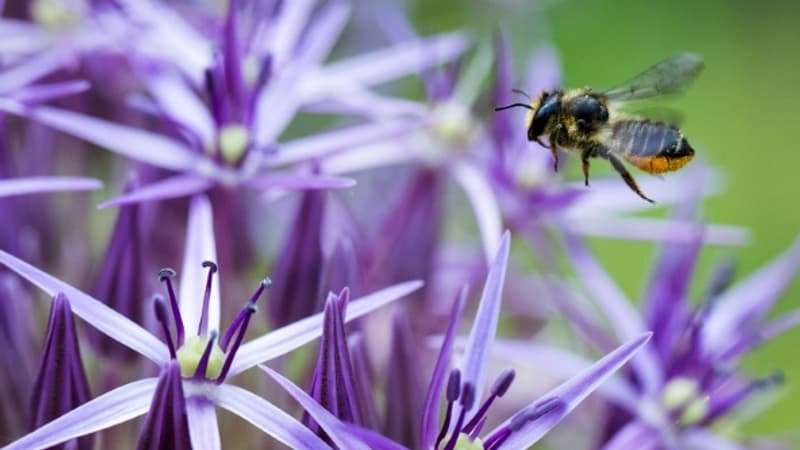The return of the neonicotinoids to France would be “a disaster”, affirmed beekeepers, scientists and elected officials, while the national examination exams in the National Assembly of a bill that plans to allow toxic pesticides again for pollinators.
This text was aimed at raising the limitations to the exercise of the farmer’s profession, transported by Senator LR Laurent Dupomb, plans to reintroduce, through the defeat for certain sectors (Hazelnut, Beet), a pesticide of the neonicotinoid family, prohibited in France since 2018, but authorized in Europe until 2033.
Voted by the Senate, the text must be examined in public session at the end of May by the National Assembly.
“This law claims to defend food sovereignty, but since when it has been acceptable to destroy a sector, that of beekeepers, save another, that of the hazelnuts, for example,” Christians Pons, president of the National Union of French Apiculture (UNAF), asked, during a press conference within the Assembly Assembly.
Yves Delaunay, Apicultor in Vendée and vice president of aF, came to testify the ravages of these insecticides about bees and anguish of farmers.
“After the arrival of neonicotinoids, in the 90, 80 kg of honey per hive, they fell to 5 kg. An incredible loss. We were never compensated. I have colleagues who hung. I almost did,” he said.
A text “Ignore science”
“I exploded 1,000 hives in Vendée. The colonies collapsed in flowering. We went in a few days of 70,000 bees at 20,000. They were disoriented, unable to return to the hive. They were found dead everywhere, in the fields, even in sunflowers flowers,” he explains. “We should not reproduce this.”
Next to his side, Philippe Grandcolas, a CNRS researcher, recalls that “scientific studies show a decrease in the order of 70 to 90% of insect populations in the landscapes most affected by the use of pesticides.”
And as “the three -fourths of the plants must be pollinated to produce”, “we have significant losses of productivity”, which reaches “30% for rapes,” he says.
Products such as acetamipride, a neonicotinoid with powerful neurotoxic effects, can last “several decades” in soils and see “their toxicity increases in 100 times in contact with fungicides” present in agricultural plots, according to the scientist.
According to the CNRS, the production of honey in France was divided by two between the mid -1990s, the date of introduction of neonicotinoids and mid -2010.
This text “is the legislative engine that our agriculture needs to restart”, on the contrary, Arnaud Rousseau, the president of the FNSA First Agricultural Union, in a message published Tuesday on LinkedIn.
Fensea is waiting in particular, in addition to the authorization of Acetamipride, “a simplification of the procedures for breeders” and “better access to water.”
“If this law is approved, it will be a disaster for bees, pollinators, for biodiversity and suddenly for agriculture as a whole, but also a disaster of public health,” said Sylvain Carrière, deputy of Hérault, asking to fight against his “general interest” during the press conference.
For his part, the socialist deputy director of Loira Pierrick Coubon denounced a text “ignoring science” and pointed out the inconsistency of certain elected officials, on the right, who “voted unanimously a few weeks ago a law against the Asian hornet and is being prepared today (…) to destroy the beekeeping sector.”
Source: BFM TV


